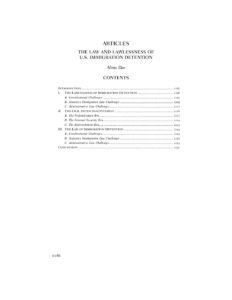The Law and Lawlessness of U.S. Immigration Detention
From the introduction:
“This Article proceeds in three parts. Part I describes how federal courts have interpreted potential sources of substantive immigration detention law and why some have produced, through their decisions, lawlessness for immigrants facing poor conditions of confinement. I focus on three areas: substantive due process, statutory immigration law interpretation, and the enforcement of agency detention standards. In each of these realms, a growing number of courts have rejected detained immigrants’ claims based on a perceived conflict with the political branches’ interest in unfettered detention authority.
Part II challenges this judicial account by unearthing the history of congressional and administrative action to address the conditions of civil immigration confinement, unwinding the political branches’ civil detention interest from their broader expansion of detention overall. I focus on congressional and executive action to regulate the conditions of immigration confinement during three periods — the federalization of immigration detention at the turn of the twentieth century, the expansion of detention during the internal security era, and the entrenchment of detention during the modern era. I argue that the political branches have expressed significant concern over the conditions of immigration confinement, with Congress directing federal immigration authorities to ensure civil conditions in the face of perceived agency mismanagement.
Part III then considers the doctrinal implications of the civil detention interest, returning to the substantive due process jurisprudence, statutory interpretation questions, and enforcement of agency detention standards discussed in Part I. Courts have placed undue weight on the federal government’s interest in detention when addressing whether conditions are unconstitutionally punitive and whether jailers demonstrate deliberate indifference. Courts have either ignored or misconstrued statutory provisions that direct administrative officials to ensure appropriate conditions of confinement. Courts’ reluctance to require the Agency to comply with detention standards is misplaced, as the enforcement of these standards implicates the concerns at the heart of the Accardi doctrine and aligns with congressional intent. A shift in judicial approach to conditions claims — one that more fully considers the complex interests of the political branches in regulating the conditions of detention — should result in more robust enforcement of substantive rights for detained immigrants. I conclude, however, by taking seriously the proposition that some courts will continue to fail to enforce the substantive law governing the conditions of immigration detention. This failure lends weight to critiques of the immigration detention system as a whole.”

